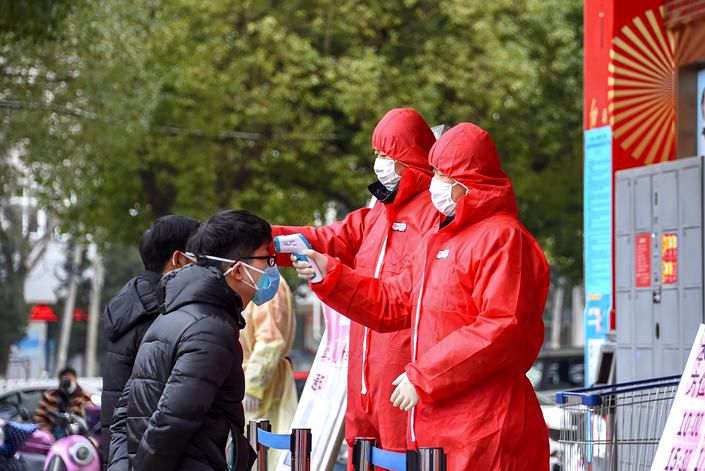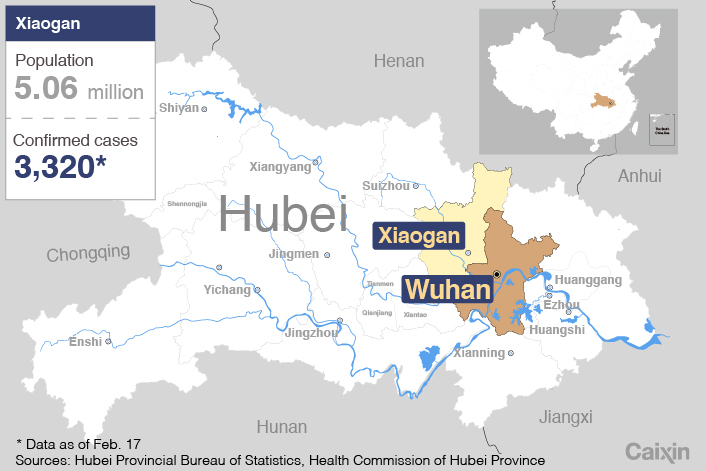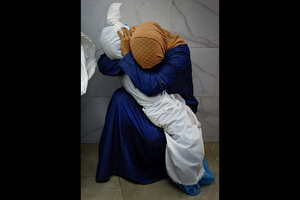China’s Super-Strict City Lockdowns May Be Illegal

 |
The government of a coronavirus-hit Chinese city is attempting to curb the spread of the new disease by effectively banning people from leaving their homes, a move that experts say might be illegal.
Since Monday, authorities in Xiaogan, a city of 5.06 million people in Central China’s Hubei province, have barred all urban residents from setting foot outside and prohibited countryside residents from taking outdoor strolls, visiting neighbors, or congregating in groups. Those who violate the rules will be detained for up to 10 days, according to an order (link in Chinese) from the city government.
The move shows how officials at the epicenter of the outbreak are resorting to ever tighter restrictions in a bid to control the number of infections. As of Monday night, Xiaogan, which lies adjacent to the epidemic-ravaged city of Wuhan, had logged (link in Chinese) 3,320 coronavirus cases and 75 deaths, according to the Hubei provincial health commission. Those numbers are respectively the second- and third-highest in the province.
A woman surnamed Hu told Caixin Global she had been effectively stranded in her hometown of Hanchuan, which is administered by Xiaogan, since returning from Shanghai on Jan. 18 to spend the Lunar New Year with her family.
The suspension of train services from the nearby transport hub of Wuhan, combined with the subsequent closure of gas stations, supermarkets, and convenience stores, has left her family increasingly confined to their home, she said.
Then on Sunday, the Hubei provincial government ordered (link in Chinese) residential areas to initiate the strictest lockdown yet, spurring local authorities to take even more drastic measures. In parts of the nearby city of Huanggang, residents were issued permits to enter and leave their compounds, police launched round-the-clock patrols in search of people wandering the streets without good reason, and violators were hauled off for “enforced study” at a nearby school.
Xiaogan’s citywide lockdown has been similarly dramatic, with authorities also banning the use of all cars except emergency and official vehicles. Those who go for an illicit drive will see their vehicles confiscated, receive a 10-day detention and a 500 yuan ($71) fine, and appear on a list of people deemed to have low social credit, according to the order.
 |
Exceptions are granted to medical workers, disease control personnel, producers of essential goods, and people in medical emergencies, but all must obtain prior official permission and travel only during designated periods and along designated routes.
With no desire to trade her parents’ apartment for a police cell, Hu spends her days watching the news with her father and playing with her 4-year-old son. Food and other essential goods are delivered to their door by community volunteers.
Despite the obvious inconvenience, she says the residents of Xiaogan have largely understood and supported the measures. “When you see the number (of infections) continuously rising, the people around the world infected by those from Wuhan, and the tirelessness of the community workers … all we can do is stay at home,” she said.
However, experts say some of the measures may exceed governments’ legal authority and violate the principle of proportionality.
Zhao Hong, a professor at the China University of Political Science and Law, told Caixin that Chinese laws only permit the National People’s Congress (NPC) — the country’s main legislative body — and its Standing Committee to set out punishments for violating restrictions on freedom of movement. As local-level governments don’t have that power, official actions in Xiaogan “have clearly violated legal stipulations,” he said.
President Xi Jinping mentioned at a central government meeting Feb. 5 that lawful forms of epidemic control demand that officials adhere to legal norms even during emergencies.
Xiaogan’s lockdown “is hard for the public to understand and accept,” Zhao said. “It’s not just that the means exceed reasonable limits, but also that there’s no appropriate link between the means and the ends,” he said. Qin Qianhong, a law professor at Wuhan University, said that local governments should “correct their mistakes” in areas where they had overstepped their legal mandates. “Otherwise, it’ll tear the social fabric, heighten resentment, and cause no end of trouble farther down the road.”
Higher-level epidemic control departments could whip their local counterparts back into shape, while the NPC and discipline inspection departments could also play a supervisory role, Qin suggested.
As of 10 a.m. Tuesday, China had recorded 72,528 coronavirus cases, around 60,000 of which were in Hubei. The country had also logged a total of 1,870 deaths, 1,789 of which were in the province.
Contact reporter Matthew Walsh (matthewwalsh@caixin.com) and editor Joshua Dummer (joshuadummer@caixin.com)

- PODCAST
- MOST POPULAR




